As loving pet owners, it’s natural to want to share everything with our furry companions, including our food. However, many common human foods that are perfectly safe and even healthy for us can be highly toxic, and sometimes even fatal, for dogs and cats. Understanding “What Foods Will Make A Dog Sick” is crucial for ensuring their safety and well-being. A recent review of studies by animal health researchers in Italy highlighted the most frequent culprits in pet poisonings globally, underscoring a significant lack of public awareness regarding these serious health threats.
While sometimes owners intentionally offer these harmful foods, accidental ingestion of common household items is a frequent occurrence. Over the past decade, numerous cases of pet poisoning have been reported, involving items ranging from chocolate products to artificial sweeteners and certain fruits. The list of toxic human foods for pets continues to expand as new cases are documented and studied. Interestingly, while some foods like chocolate have long been recognized as dangerous, others, such as grapes, have only recently emerged as significant concerns, sometimes leading to misdiagnoses in the past. Dogs, in particular, are often more affected than cats due to their less discerning eating habits. Knowing what type of human food can puppies eat can help in making informed choices for your young companions.
The Dangers of Chocolate, Coffee, and Caffeine
Chocolate and other caffeine-containing products are among the most common causes of food poisoning in pets. These items can lead to a range of issues, from mild stomach upset to severe seizures and even death. Poisoning incidents often surge around holidays when more chocolate products are readily available in homes.
 A latte, a cup of coffee, and hot chocolate, all common sources of caffeine.
A latte, a cup of coffee, and hot chocolate, all common sources of caffeine.
The toxic compounds in chocolate are theobromine and caffeine. These substances disrupt cellular processes, leading to the overstimulation of both the central nervous system and heart muscles. The severity of the reaction depends on the type of chocolate; darker chocolate contains significantly more theobromine than milk chocolate, meaning even a small piece can be enough to sicken a small dog. Beyond chocolate bars, these compounds are also found in other products like herbal supplements, cacao bean shell mulch, and caffeine tablets.
Initial symptoms typically appear within 2 to 4 hours after ingestion and include restlessness, excessive thirst, urinary incontinence, and vomiting. Affected dogs may appear excited, develop a fever, or experience a rapid heart rate. Prompt veterinary treatment is crucial for recovery, as delayed intervention can result in seizures, coma, or even death from abnormal heart rhythms or respiratory failure.
The Hidden Threat of Xylitol
Xylitol, an artificial sweetener, is another prevalent and increasingly concerning toxic food for pets. It’s commonly found in sugar-free gums, candies, certain baked goods, and even some dental care products due to its antibacterial properties.
Dogs are particularly vulnerable to xylitol poisoning, which can lead to severe, life-threatening clinical signs. In dogs, xylitol triggers a rapid release of insulin, causing a dangerous drop in blood sugar levels (hypoglycemia). This effect is unique to dogs and not observed in humans.
Symptoms of xylitol poisoning can manifest anywhere from 30 to 60 minutes to up to 12 hours after ingestion. These include vomiting and signs associated with low blood sugar, such as lethargy, loss of coordination, collapsing, and seizures. If you suspect your dog has ingested xylitol, immediate veterinary attention is vital.
Onions, Chives, Garlic, and Leeks: The Allium Genus
Members of the Allium genus, including onions, chives, garlic, and leeks, are frequent causes of illness in both dogs and cats. These common culinary ingredients contain organosulfoxide compounds. When pets chew these plants, the organosulfoxides are converted into complex sulfur compounds that can damage and break down red blood cells, leading to a condition called hemolytic anemia.
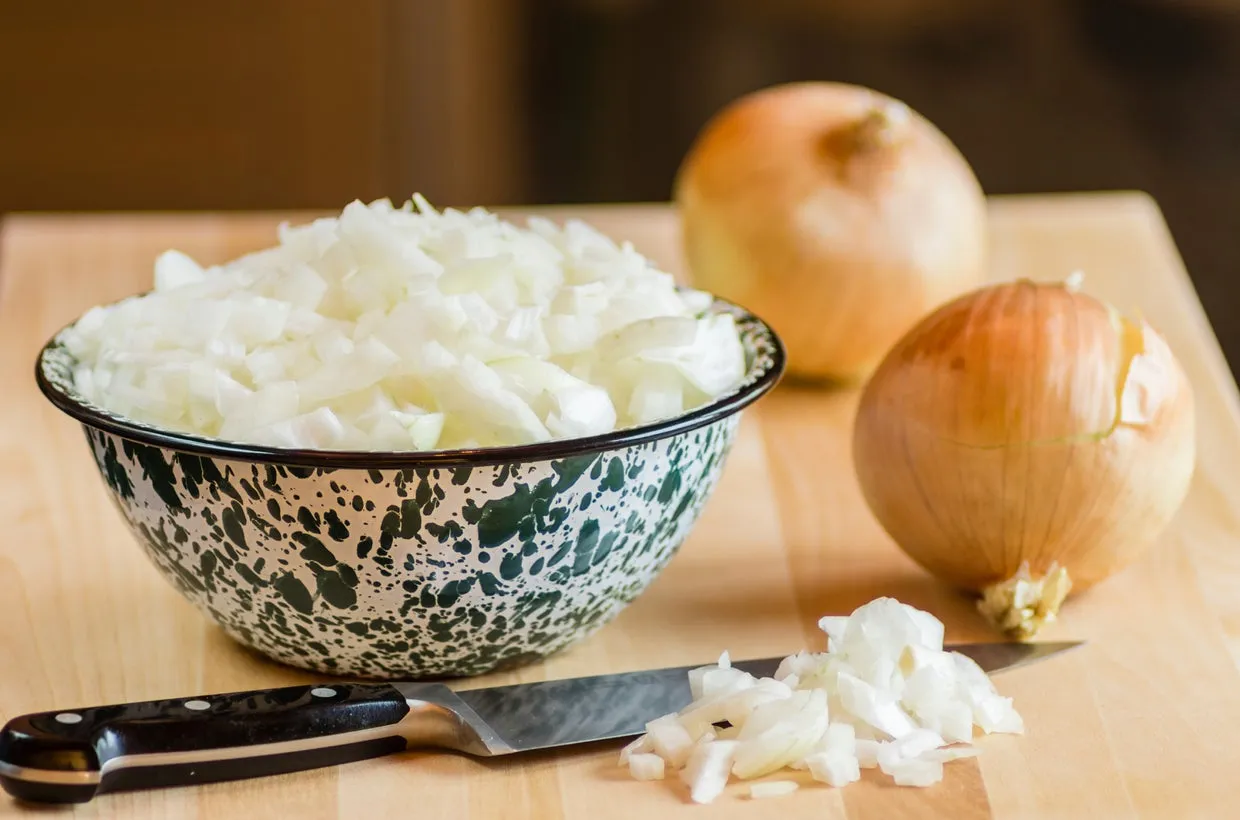 A variety of fresh onions, garlic, and leeks, which belong to the Allium genus and are toxic to pets.
A variety of fresh onions, garlic, and leeks, which belong to the Allium genus and are toxic to pets.
Even a small amount—specifically, 5 grams of onion per kilogram of body weight for cats or 15 to 30 grams per kilogram for dogs—can cause dangerous changes to their blood. Cases reported have involved various forms, including raw and baked garlic, onion soufflé, butter-cooked onions, and steamed dumplings with chives. Crucially, these toxic compounds remain active even after cooking or drying. Most ingestions are accidental, though rare instances of intentional feeding have occurred. While some pets may not show symptoms, fatal poisonings have been recorded.
Symptoms of Allium poisoning can be delayed, appearing a day or even several days after consumption, depending on the amount ingested. Initial signs often include vomiting, diarrhea, abdominal pain, and loss of appetite. Affected animals may then develop anemia, showing symptoms such as weakness, rapid breathing, an elevated heart rate, pale mucous membranes, and reddish or brown urine. If your dog is sick, understanding what do dogs eat when sick can help you provide appropriate care and nutrition after consulting with your vet.
The Hazards of Alcohol
Ethanol, or alcohol, poisoning in small animals typically occurs when they accidentally consume alcoholic beverages. However, it’s important to know that alcohol poisoning in dogs has also resulted from ingesting fermented items like rotten apples, sloe berries used for sloe gin, and uncooked bread or pizza dough, all of which contain ethanol.
When pets digest ethanol, it is rapidly absorbed from their gastrointestinal tract and quickly affects the brain, much like in humans. Within an hour, affected animals may exhibit depression, loss of motor control, lethargy, sedation, and an elevated body temperature. Severe cases can lead to coma and dangerously slowed breathing. In most reported instances, pets recover with prompt treatment and supportive care.
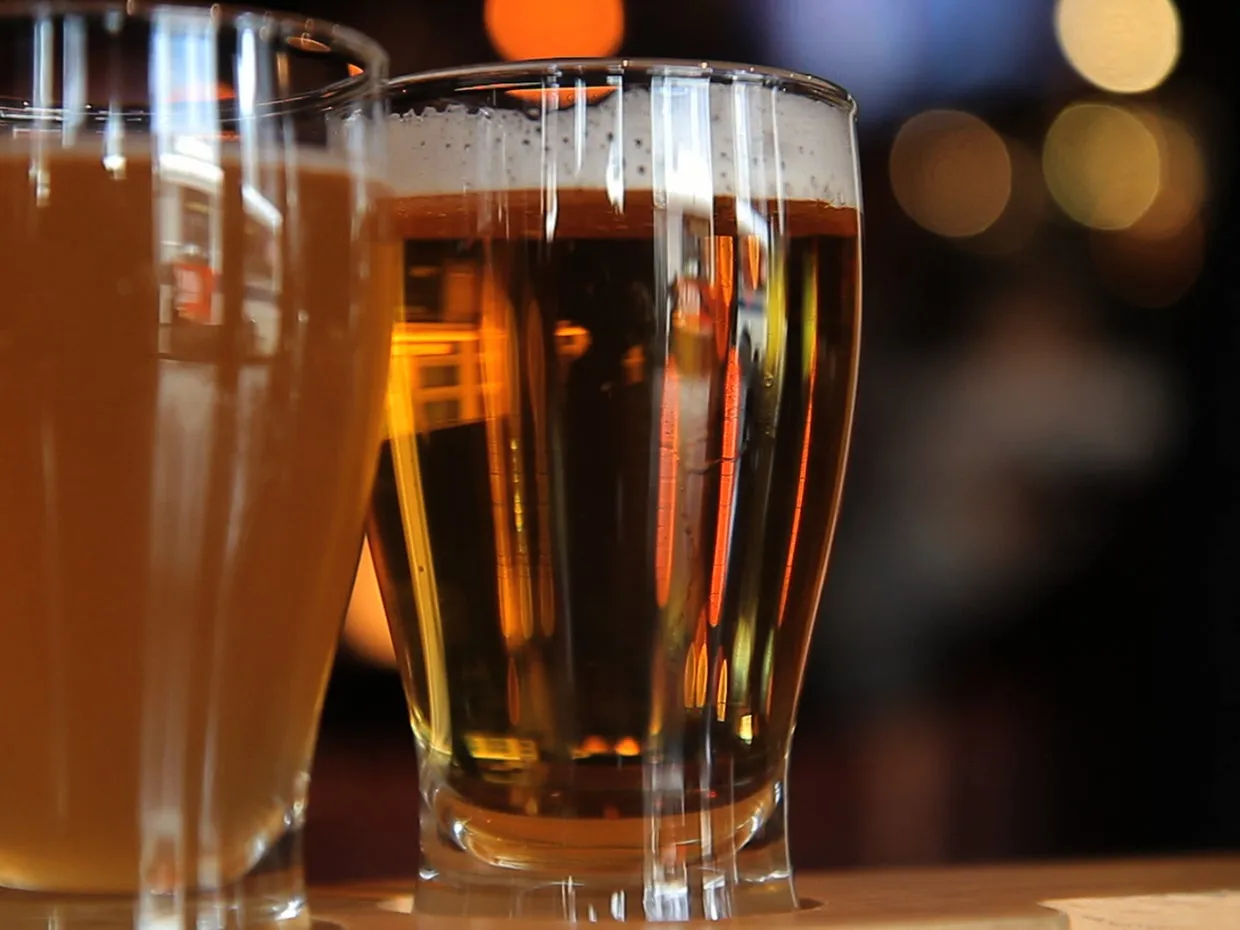 A glass of beer and hops, indicating potential sources of alcohol.
A glass of beer and hops, indicating potential sources of alcohol.
It’s also worth noting that ethanol isn’t exclusively found in food and drinks. Products like certain paints, varnishes, medications, perfumes, mouthwashes, and some types of antifreeze also contain this compound and pose a significant risk to pets if ingested. Being aware of these household hazards is just as important as knowing which foods to avoid.
Grapes and Raisins: A Mysterious Danger
Grapes, raisins, sultanas, and currants, whether raw or cooked (including those found in snack bars and baked goods), have been linked to acute kidney failure in dogs. However, the exact mechanism of toxicity remains unknown, and not all dogs react to these fruits in the same way.
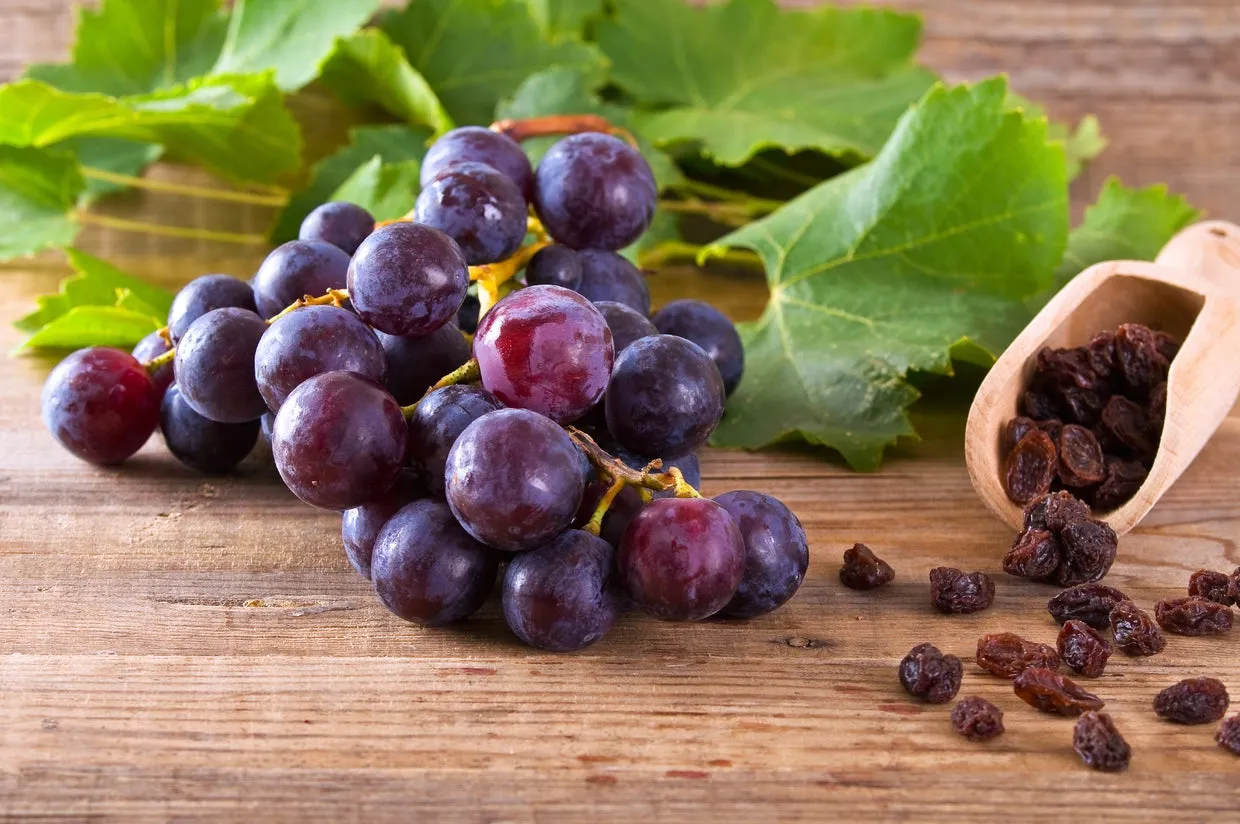 Fresh green grapes and dried raisins, both potentially toxic to dogs.
Fresh green grapes and dried raisins, both potentially toxic to dogs.
A study reviewing 180 case reports of canine grape/raisin ingestion revealed a wide range of sensitivities: some dogs showed no symptoms after consuming 2 pounds (0.9 kg) of raisins, while others tragically died after eating just a handful. Dogs that do develop symptoms may exhibit vomiting, diarrhea, loss of appetite, lethargy, and abdominal pain within 24 hours of ingesting these fruits. Due to the unpredictable nature and severity of this toxicity, it’s safest to keep all grapes and related dried fruits away from your dog.
Hops: A Risk for Brewing Enthusiasts
Hops, commonly used in beer brewing, have become an increasing risk to pets, especially with the rise in popularity of home brewing. These plants contain a variety of compounds, including resins, essential oils, and tannins, which can cause severe reactions in pets.
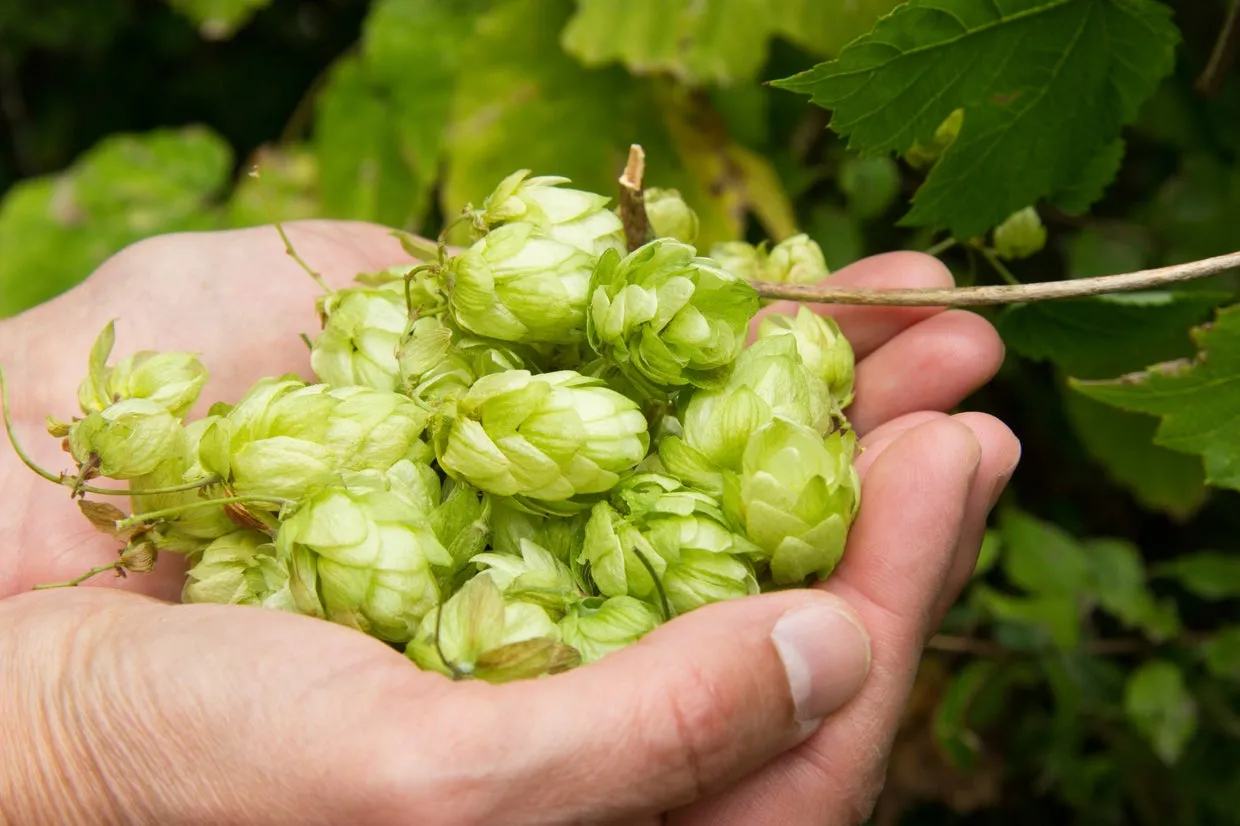 Dried hops flowers, commonly used in brewing and toxic to dogs.
Dried hops flowers, commonly used in brewing and toxic to dogs.
When ingested, hops can lead to a dangerous elevation in body temperature (fever). Other symptoms include anxiety, a rapid heart rate, panting, vomiting, abdominal pain, and seizures. Symptoms typically appear within hours of consumption. The risk of death can remain high even after the animal receives treatment for fever, highlighting the serious danger hops pose to pets. If you brew at home, ensure all hops and brewing materials are securely stored out of your pet’s reach.
Macadamia Nuts: A Cause for Weakness
Macadamia nuts are a popular and nutritious snack for humans, but they can cause poisoning in dogs. While the exact toxic dose isn’t definitively established, some reports suggest that ingesting as little as 0.7 grams per kilogram of body weight can induce symptoms.
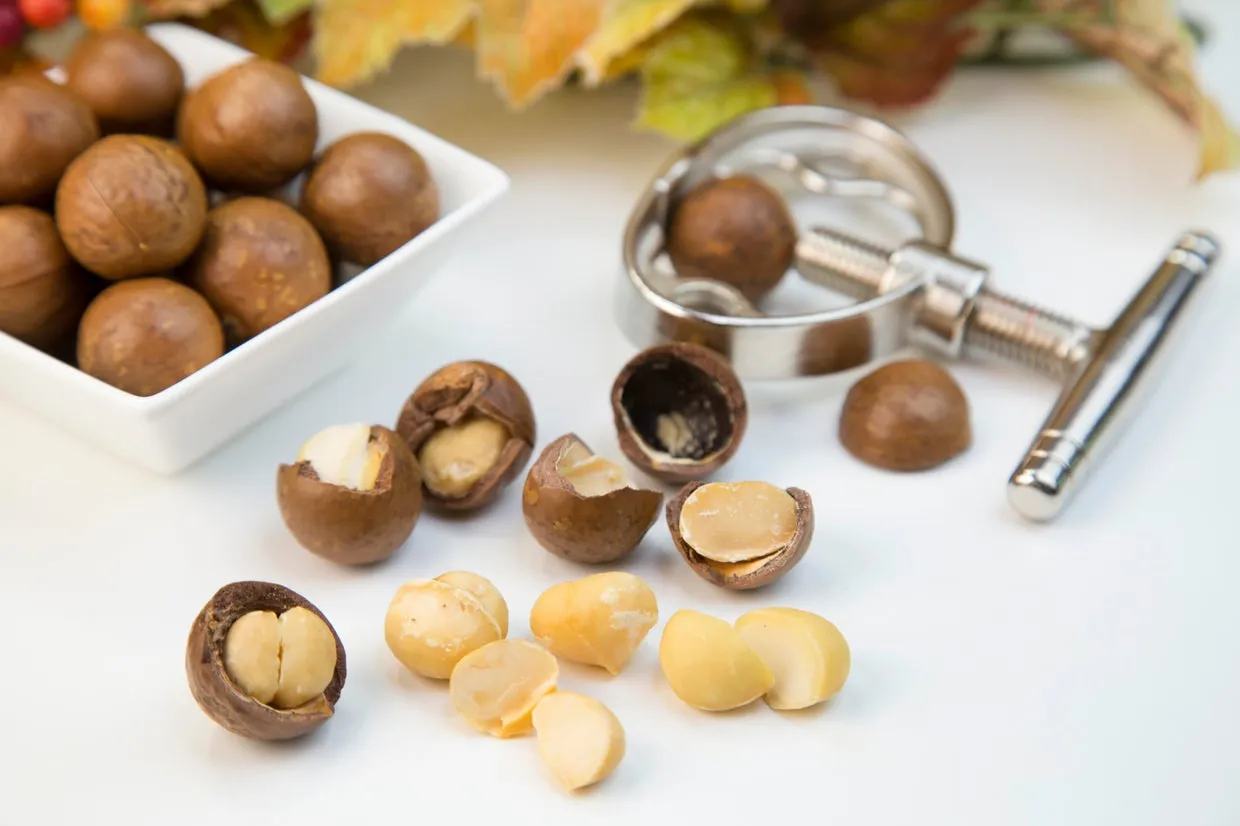 Shelled macadamia nuts in a bowl, a healthy human snack that can be toxic to dogs.
Shelled macadamia nuts in a bowl, a healthy human snack that can be toxic to dogs.
Symptoms of macadamia nut poisoning usually develop within 12 hours and can include weakness, particularly in the hind limbs, vomiting, inability to control movements (ataxia), shaking, fever, abdominal pain, stiffness, and pale mucous membranes. Although not very common, over 80 cases were reported in just five years in Queensland, Australia, a major macadamia nut cultivation region. Fortunately, no pet deaths have been directly linked to macadamia nut ingestion to date, and most animals are expected to make a full recovery within a day or two with minimal veterinary care. Still, it’s best to err on the side of caution and keep these nuts away from your dog. Considering what meat should a dog never eat is also important for a comprehensive understanding of canine nutrition and safety.
Conclusion
Understanding what foods will make a dog sick is a vital part of responsible pet ownership. The list of human foods that pose a threat to our canine companions is extensive and ever-growing, including common items like chocolate, xylitol, onions, garlic, grapes, raisins, alcohol, hops, and macadamia nuts. Each of these can lead to varying degrees of illness, from mild digestive upset to life-threatening conditions.
Always be vigilant about what your dog has access to, both in your home and during walks. Educating yourself and your family about these dangers can prevent accidental poisonings. If you suspect your dog has ingested any toxic food, contact your veterinarian immediately for guidance. Early intervention can significantly improve your pet’s chances of a full recovery. For more information on safe feeding practices, explore articles like what should i give my dog to eat and what meat can you feed your dog on Dog Care Story.
